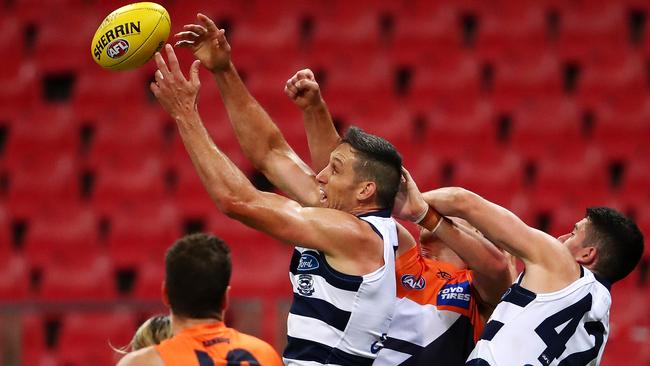Better or worse? Superior athletes doesn’t mean better game
For a game so good at measuring everything, Australian football has nothing to gauge whether it’s getting better.

For a game so good at measuring everything, Australian football has nothing to gauge whether it’s getting better.
Yes, the spreadsheets of statistical categories are a guide, but beauty and art are in the eye of the beholder.
Port Adelaide coach Ken Hinkley reckons the game’s not only better, it’s “way better” than the alleged good old days.
“There is no doubt about that,” Hinkley told SEN this week.
“The game is more explosive, the game is more challenging and I think the game is fantastic.
“I’ve been around for a long time, so I’ve played in it and coached in it, the game is in an absolutely great position right now.”
He’s played and coached the game — that’s perfectly correct — but self-praising a game style prescribed by his fellow coaches is not necessarily a recommendation.
Because while the coaches seem to say it’s better, some have a different view.
Fresh from iso-viewing the ’89 Hawthorn-Geelong grand final and the ’86 Victoria/WA State of Origin clash among others, many beholders are asking whether the game has actually regressed.
With a Brownlow and Magarey hanging from his neck, a Coleman, Ken Farmer, two player-premiership medals, a couple of coach-premiership gongs and sundry statues, Malcolm Blight is a worthy spokesman for the disaffected.
Pushing his barrow from behind an Adelaide radio microphone, Blight bemoans the “dreadful, defensive” style of modern football, where players are more “tackling machines” than footballers.
“Everyone can see it bar the people too close to it,” he said on Sportsday SA. “I don’t know why.”
Good question. Another good question is what makes a good game of football?
For all the numbers and graphs and stats, there’s no way of accounting for quality.
Sure, some stats can be used as a guide. Scoring, for example. Everyone loves a goal but last season scoring fell to a 52-year AFL/VFL low. A close game brings a certain frisson, but a close game is not necessarily a good game. Taken to its logical extension, a nil-all draw is a good game.
A close game made close by sloppy skills, poor goal-shooting and a defence-is-king mentality is definitely not a good game.
Congestion can be assessed by the stoppage numbers, and in 2019 they were at their second-highest mark in 20 years.
Hinkley’s right, to a point, that the game is better because players are stronger, faster and fitter, but hey, we’re talking football here, not the Olympics.
The game’s beauty lies with its artists; but true footballers are being winnowed out in their teens.
A game that always prided itself as being for all shapes and sizes has evolved into the domain of the tall, fast and strong.
The high art purveyed by those in the mould of Sam Mitchell is lost when skilful ball players are shunted into an evolutionary cul-de-sac because they’re too short, too slow or take too long to complete their beep test.
At 188cm, would James Hird, among the most accomplished of the modern maestros, be drafted as a centre-half forward today? Would he be drafted at all?
Careers turn on a player’s speed rather than their speed of mind. On their standing leap rather than their kick on (non-preferred in the contemporary jargon).
Recently retired Adelaide onballer Richard Douglas was playing a different game when he debuted in 2006.
“The way the game was played, the one-on-ones and the contests and the unpredictability of football was exciting,” Douglas told Blight’s radio show. “And then around, I don’t know when it was, 2010 or 2012, structures and defensive pressure became super important. The game really did not become enjoyable to play, which was sad to see because we all love the game.
“The contest is there, but the spectacle has really dropped away and that’s been highlighted in some of the footy flashbacks we’ve seen in the past few weeks from games in the 90s and 2000s.
“It’s just gone away from being able to show your natural flair.
“It’s gone away from your big high-marking forwards and your exciting running goals. We’ve got to find a way to get it back.
“I can’t really see it happening without reducing the number of players on the field. There’s too much congestion. Players cover the ground too well and coaches are going to be able to manipulate subtle rule changes.”
It always seems to come back to the coaches. Douglas’s candour is refreshing, but such honesty has even more currency when it comes from a current player.
Douglas’s former Adelaide teammate Jake Kelly said the AFL’s financial issues might counterintuitively lead to more attractive football.
“Over the coming years as staff dwindle, with less coaches, less meetings, players will play with more freedom,” Kelly said.
“There will be less voices in players’ heads, so there is definitely the potential for the game to become a bit more relaxed in terms of structure.
“Aside from the fact that there will be less people at the club, which isn’t great because people are losing jobs which is a major negative, you will have less people telling you what to do.
“A lot of players will relish that because in the past few years there definitely has been a trend towards having a lot of voices telling you what to do, where to play, where to stand.
“The game has become very structured and it doesn’t make the game look great.’’
After such a long break, they’ll want to play football like never before. Pent-up players free to play their own way? June 11 might be the day football sent its curve trending up again.



To join the conversation, please log in. Don't have an account? Register
Join the conversation, you are commenting as Logout